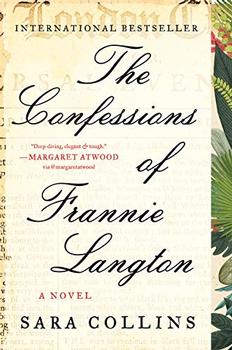Summary | Excerpt | Reading Guide | Reviews | Beyond the Book | Readalikes | Genres & Themes | Author Bio

Then you said, 'For God's sake, give me something I can save your neck with.'
But how can I give you what I do not have? Remembering is a thing that happens or doesn't, like breathing.
So I told you that story. I suppose I wanted to show you there was love between me and her. Though what good does that do? Whatever she and I were to each other is not a thing you men would care for. At any rate, love is no defence to murder, as you said, though, more often than not, it's an explanation.
But this is a story of love, not just murder, though I know that's not the kind of story you're expecting. In truth, no one expects any kind of story from a woman like me. No doubt you think this will be one of those slave histories, all sugared over with misery and despair. But who'd want to read one of those? No, this is my account of myself and my own life and the happiness that came to it, which was not a thing I thought I'd ever be allowed, the happiness or the account.
I have the paper you gave me, and a fresh quill, and your instructions to explain myself.
Any gaol-bird could tell you that for every crime there are two stories, and that an Old Bailey trial is the story of the crime, not the story of the prisoner.
That story is one only I can tell.
Paradise, Jamaica, 1812‒25
Chapter Two
I used to be called Frannie Langton before I was taken from Paradise to London and given by Langton as maid to Mr George Benham, who then gave me to his wife. It wasn't my choice to be brought here, but very little in my life ever was. I was Langton's creature. If I pleased him I pleased myself. If he said something was to be, it was. But Langton was a man who'd named his own house Paradise despite all that went on there, and named every living thing in Paradise too. What more do I need to tell you about him?
Where I come from, there's more than one way a man gives you his name. He marries you or he buys you. In some places that is the same thing, and they call it a dowry, but it's a truth everybody must savvy that in some places a man has no need to marry what he's bought.
This isn't going to be the story of all that was done to me at Paradise, or of everything I did. But I'll have to include some of it, I suppose. I've always wanted to tell my story, even though one person's story is only a raindrop in an ocean. But if you've ever stood in the sea when rain's coming then you know they're two different kinds of water. Seawater is nothing like the first cold drop springing fresh on your face, then another on your tongue, then another, pat-pat-pat on your closed eyelids until all around you rainwater's slapping at the sea.
The difficult thing is to know where to start. My life began with some truly hard things, but my story doesn't have to, even though nothing draws honesty out of you like suffering. The receiving of it, but the giving also.
I was born at Paradise and I was still a small girl when they took me from the slave quarters up to the house. For a long time, I thought that was a stroke of luck, but it was nothing more than the liar's habit of trying to make fact better than truth.
Some nights, if Phibbah had left the shutters open and the candles lit, I could creep along the river through damp grass, hide behind the sugar mill, gawp at the house. Yellow light shivered at the windows like church glass, and Miss-bella's shadow stretched grey and tall as she drifted past them. I pictured her inside, getting ready for bed, rolling towards Langton. The syrupy way white women move. Not like the cabin-women, who were quick as hens.
The house was a sight come morning too. Sun shining like Langton's church shoes. Heat already gripping my throat but still a cat's tail of mist. I'd walk the track through the guinea grass up to the front porch. Out in the cane-piece, the men waiting for their bowl of mash. Lime-washed walls, porch wide as shoulders, the logwood shutters Miss-bella made Manso put up to shut out the bad air. I liked the idea that the house was as new as me. Langton used to brag about making Manso and the hired-on stonemasons and carpenters work like clocks for three years getting it plumb.
Excerpted from The Confessions of Frannie Langton by Sara Collins. Copyright © 2019 by Sara Collins. Excerpted by permission of HarperCollins Publishers. All rights reserved. No part of this excerpt may be reproduced or reprinted without permission in writing from the publisher.
Your guide toexceptional books
BookBrowse seeks out and recommends the best in contemporary fiction and nonfiction—books that not only engage and entertain but also deepen our understanding of ourselves and the world around us.